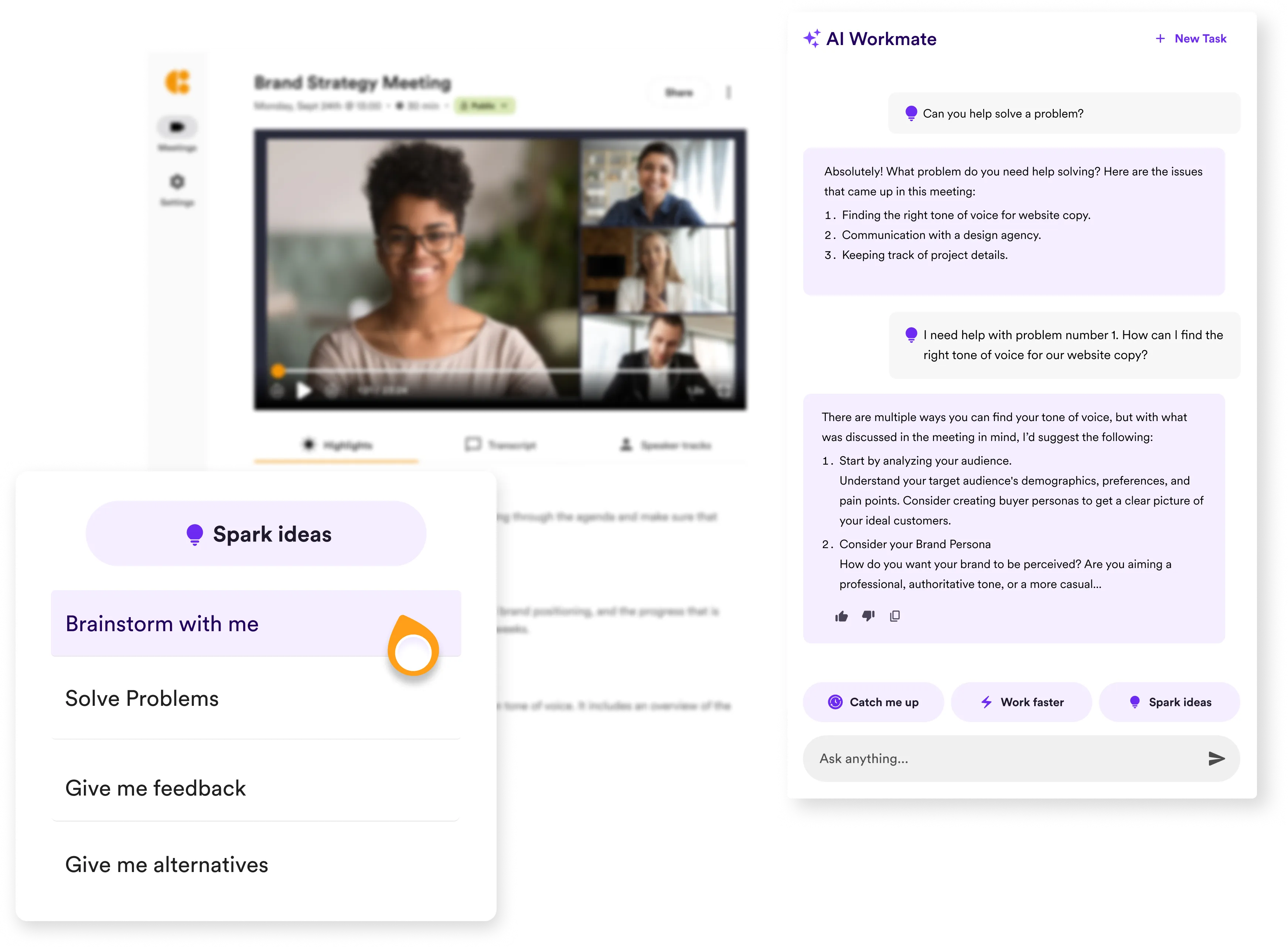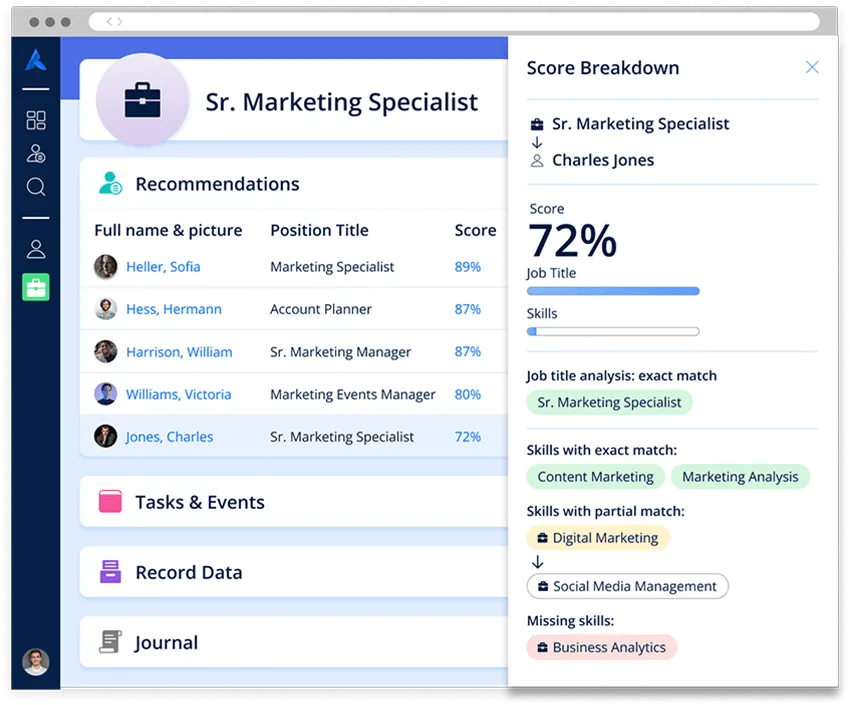+50 Behavioral Interview Questions to Ask your Candidates

To make the right recruitment decision, you need to understand how candidates think, how they act under pressure, and how they solve problems.
That’s where behavioral interview questions come in.
In this article, we’ll explore how to ask behavioral interview questions effectively, and many examples of questions that you can use.
What are Behavioral Interview Questions?
Behavioral interview questions help recruiters understand candidates by digging into how they have handled past situations.
Instead of vague claims like "I'm a great leader," candidates are asked to share specific examples that prove their abilities. It’s all the "how" behind their experiences.
These questions often relies on the STAR methodology. The STAR method originated with Tom Janz, a human resources psychologist, who believed that past behavior is the best predictor of future performance.
He realized that by asking about specific past experiences, recruiters could get much clearer insight into a candidate’s capabilities. Instead of relying on general statements, you get concrete evidence of what a candidate has actually done. It's also a way to structure your interviews.
The STAR method breaks down like this:
- Situation: Ask the candidate to describe a specific situation they were involved in. This helps set the context for their story. For example: "Tell me about a time you faced a difficult challenge at work."
- Task: Next, find out what their role was. What was the objective in that situation? This part focuses on their specific responsibility. For example: "What was your goal in that situation?"
- Action: Then, dive into what they actually did. This is where you learn about the actions they took to address the task. For example: "What steps did you take to overcome the challenge?"
- Result: Finally, ask about the outcome. What happened as a result of their actions? This helps you evaluate the impact they made. For example: "What was the outcome of your actions?"
The STAR method works well for both experienced candidates and those without formal job experience.
It allows entry-level candidates to share examples from school projects or volunteer work, giving them a chance to demonstrate potential.
20 Examples of Behavioral Interview Questions

Here are 20 examples of behavioral interview questions, each with subquestions using the STAR framework to help you evaluate candidates effectively:
- Tell me about a time when you disagreed with a team member. How did you handle it?
- Situation: What was the disagreement about? Who was involved?
- Task: What role did you play in the situation? What were you trying to achieve?
- Action: How did you address the disagreement? What steps did you take to resolve it?
- Result: What was the outcome? Were you able to resolve the conflict, and if so, how?
- Describe a situation where you demonstrated leadership skills.
- Situation: What was the context where leadership was required?
- Task: What was your role, and what was expected of you?
- Action: What actions did you take to lead the team?
- Result: What was the result of your leadership? How did the team respond?
- Give an example of a time when you had to handle a difficult customer.
- Situation: What was the customer's issue?
- Task: What was your responsibility in the situation?
- Action: What actions did you take to address the customer's concerns?
- Result: How did the customer react? Were you able to resolve the issue to their satisfaction?
- Tell me about a goal you set for yourself. How did you achieve it?
- Situation: What was the goal, and why was it important to you?
- Task: What steps did you plan to take to achieve the goal?
- Action: What actions did you take to work towards the goal?
- Result: Did you achieve the goal? What did you learn from the process?
- Describe a time when you failed at something. What did you learn?
- Situation: What was the situation, and what led to the failure?
- Task: What were you trying to accomplish?
- Action: What actions did you take, and why did they not work as expected?
- Result: What was the outcome, and what lessons did you learn from the experience?
- Can you give an example of a time you had to manage multiple tasks? How did you prioritize?
- Situation: What tasks were you handling at the same time?
- Task: What was your goal in managing these tasks?
- Action: How did you prioritize your tasks? What strategies did you use?
- Result: What was the outcome? Were you able to complete all tasks successfully?
- Tell me about a time when you had to make a decision under pressure.
- Situation: What was the high-pressure situation?
- Task: What decision needed to be made?
- Action: How did you make the decision? What factors did you consider?
- Result: What was the result of your decision? How did it impact the situation?
- Describe a situation where you went above and beyond to meet a deadline.
- Situation: What was the project or task, and why was the deadline important?
- Task: What were you responsible for?
- Action: What extra steps did you take to ensure the deadline was met?
- Result: Did you meet the deadline? How was your effort received?
- How have you handled a situation where you had to work with a difficult colleague?
- Situation: What made the colleague difficult to work with?
- Task: What was your goal in working with them?
- Action: How did you approach the situation to maintain a productive relationship?
- Result: Were you able to work effectively with them? What was the outcome?
- Tell me about a project you are most proud of and why.
- Situation: What was the project, and why was it significant?
- Task: What role did you play in the project?
- Action: What actions did you take to contribute to the project's success?
- Result: What was the outcome, and why are you proud of it?
- Describe a time when you had to adapt to significant changes in the workplace.
- Situation: What change occurred, and how did it impact you?
- Task: What was your responsibility in adapting to the change?
- Action: How did you adapt to the new situation?
- Result: What was the result of your adaptation? How did it benefit you or your team?
- Give an example of a problem you solved in a creative way.
- Situation: What was the problem?
- Task: What was your role in solving it?
- Action: What creative approach did you take to solve the problem?
- Result: What was the outcome? Was your solution effective?
- Describe a time when you provided excellent customer service.
- Situation: Who was the customer, and what was their need?
- Task: What was your responsibility in the situation?
- Action: What actions did you take to provide exceptional service?
- Result: How did the customer respond? What impact did it have?
- Tell me about a time you successfully managed a conflict.
- Situation: What was the conflict, and who was involved?
- Task: What was your role in resolving the conflict?
- Action: How did you approach the conflict resolution?
- Result: What was the outcome? Was the conflict resolved successfully?
- How did you deal with an unexpected obstacle in your work?
- Situation: What was the obstacle?
- Task: What was your objective at the time?
- Action: What steps did you take to overcome the obstacle?
- Result: Were you successful in overcoming it? What did you learn?
- Give an example of a time you had to persuade someone to see things your way.
- Situation: Who did you need to persuade, and why?
- Task: What was your goal in persuading them?
- Action: What approach did you take to convince them?
- Result: Were you successful? How did they respond?
- Describe a challenging project you worked on.
- Situation: What made the project challenging?
- Task: What was your role in the project?
- Action: How did you address the challenges?
- Result: What was the outcome of the project?
- Tell me about a time when you showed initiative and took on responsibilities beyond your job.
- Situation: What was the context that required extra initiative?
- Task: What responsibilities did you take on?
- Action: What actions did you take to go above and beyond?
- Result: What was the impact of your initiative?
- Describe a situation where you had to work under minimal supervision.
- Situation: What was the task or project?
- Task: What were your responsibilities?
- Action: How did you manage your work without much guidance?
- Result: Were you successful in completing the task? What was the outcome?
- Give an example of a time when you led a successful project or task from start to finish.
- Situation: What was the project, and what was its objective?
- Task: What was your role in leading it?
- Action: What steps did you take to ensure the project was successful?
- Result: What was the outcome? How did it benefit the organization?
Examples of Behavioral Interview Questions for Common Positions

Here are five examples of behavioral interview questions that are often used for some of the most common job positions :
- Customer Service Representative:
- Tell me about a time when you had to deal with an angry customer. How did you handle the situation, and what was the result?
- Describe a time when you went out of your way to help a customer. What did you do, and why?
- Can you give an example of how you handled a situation where you didn’t have the answer to a customer’s question?
- Tell me about a time when you had to explain something complicated to a customer. How did you make sure they understood?
- Describe a situation where you had to manage multiple customer requests at the same time. How did you prioritize them?
- Team Leader:
- Describe a time when you had to motivate your team to achieve a challenging goal. How did you go about it?
- Tell me about a time when a team member was not meeting expectations. How did you handle it?
- Can you give an example of how you resolved a conflict between two team members?
- Describe a time when you had to make a difficult decision that affected your team. What was the outcome?
- Tell me about a project where you had to delegate tasks. How did you ensure everyone stayed on track?
- Sales Associate:
- Tell me about a time when you exceeded your sales target. What did you do differently?
- Describe a challenging sales situation you faced. How did you overcome it?
- Can you give an example of how you turned a "no" into a "yes"?
- Tell me about a time when you had to build a relationship with a difficult customer. What approach did you take?
- Describe a time when you had to handle a product return or complaint. How did you resolve the issue?
- Project Manager:
- Describe a project that did not go according to plan. How did you handle it?
- Tell me about a time when you had to manage a tight deadline. What steps did you take to ensure the project was completed on time?
- Can you give an example of how you managed a project budget effectively?
- Describe a time when you had to deal with a difficult stakeholder. How did you manage the situation?
- Tell me about a project where you had to coordinate with multiple teams. How did you ensure smooth communication?
- Software Developer:
- Describe a challenging bug or issue you encountered in a project. How did you go about resolving it?
- Tell me about a time when you had to learn a new technology to complete a project. How did you approach it?
- Can you give an example of how you optimized code for better performance?
- Describe a time when you had to work on a project with unclear requirements. How did you handle it?
- Tell me about a feature you implemented that improved user experience. What was the impact?
Automate your Behavioral Interviewing Process : Noota

Tired of taking notes of your candidates' answers ? By simplifying and automating key aspects of the interview process, Noota helps recruiters and hiring managers make better, faster, and more informed decisions :
- Interview Guidelines and Reminders: Noota provides reminders about the key questions you want to ask during the interview. This ensures that you cover all essential topics and follow the structured flow of the conversation. No more missing important questions due to the natural ebb and flow of the discussion.
- Automatic Recording and Transcription: Forget scribbling notes during the interview. Noota automatically records and transcribes the entire conversation in real time. This frees you to fully engage with the candidate, building rapport and picking up on non-verbal cues. The detailed transcription also makes it easy to review what was said afterward without relying on memory or hastily written notes.
- Structured Summaries: Instead of sifting through pages of notes or re-listening to recordings, Noota generates concise, structured summaries for each interview. These summaries highlight the key takeaways, strengths, and areas for improvement for each candidate, making it easy to compare candidates side by side.
- Objective Evaluation with Custom Templates: Noota enables you to evaluate candidate responses using any interview method you prefer, such as the STAR (Situation, Task, Action, Result) technique. You can customize your evaluation templates, ensuring a consistent and objective approach to assessing all candidates.
Want to record and assess automatically behaviroral answers ? Try Noota for free.
Leverage your Interview Data
AI interview notes, scorecard, follow-up, ATS integration, and more...
Related articles

Forget note-taking and
try Noota now
FAQ
In the first case, you can directly activate recording as soon as you join a videoconference.
In the second case, you can add a bot to your videoconference, which will record everything.
Noota also enables you to translate your files into over 30 languages.

.svg)
.svg)
.webp)

.png)


.svg)
